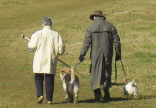Dog Behaviour
Ex-Street Dogs
It seems that every other person you talk to in the Zurich area of Switzerland with a dog has an ex-street dog from various countries including Bulgaria, Romania, Russia, Hungary, Greece, Spain, Italy and others.
When I first started helping people with their dogs in Switzerland a high percentage of these were ex-street dogs and I found my wolf behaviour knowledge useful as some of these dogs are certainly more 'wild' than the average pet dog pure or mixed breed.
Some show very shy / cautious behaviour to people they don't know, some only show this behaviour to mainly men, this I believe comes from that in these countries it tends to be men that kick them on the street when these dogs are begging for food, often if a dog is rescued from the street it will be by a woman, then often its mainly women at the rescue centres in these countries again when they come to a rescue centre in Switzerland it's mainly women working there, the girlfriend or wife takes the dog from the Swiss rescue centre and everything may be fine until the boyfriend or husband comes home from work and the dog hides underneath a table for 6 weeks! So it can be that these dogs will trust women more than men but the more men they meet in a controlled situation then in time they can learn to trust men as well.
Some dogs seem more wild than others, the number of generations of being a street dog may have a bearing here, if they were left alone I think in time they would return to look more like a wolf, some I have seen already show this or perhaps more like the proto dog which is a possible link to how wolves may have 'domesticated' themselves, the theory being that at around the same time we developed more settlements some wolves used to scavenge food from the outskirts of our settlements, the problem was they had a long flight drive so any scent or sight of a human from long distance and they would run off, the thinking is that after some time these wolves that scavenged from us bred together and formed the proto dog which had a short flight distance and a smaller brain as it simply didn't need a bigger brain just to scavenge food, this then enabled us to more easily gain trust of these animals compared to the wolf and hence in time we bred certain dogs together to get the behaviour we wanted for a particular job we wanted these animals to do.
Plenty of people have tried to domesticate a wolf and nobody has been successful, so the above may make sense.
In general I find ex-street dogs are good with other dogs as they had a natural teacher on the streets not a human as most dogs would have, so their dog social skills tends to be very high and they know what to do in most situations when coming across another dog on the walk...ie just to stand still if another dog charges them, to hide their stomach by lying on the ground until they know its safe and then showing their stomach to show the other dog they trust them, lip licking to ask for calmness or going into play mode which I believe all dogs do sometimes as a way of avoiding confrontation, its much better to play than have a fight! Possibly being more wild they know its always good to avoid being injured.
So this is a plus compared to a 'normal' dog that hasn't been socialized properly with other dogs and hence doesn't have the social skills and can be a problem with other dogs, the main problem as I see it for the ex-street dogs is teaching them how to live in 'our world', modern society already makes things a lot harder for a 'normal' dog and more restrictions are placed on dogs all the time and we expect a dog to behave in all situations.
Sometimes I think we are looking at things the wrong way round, more importance is placed on dog training all the time yet some dogs still don't behave in certain situations as we would like them to, some dogs seem more open and receptive to dog training than others, instead if we were to 'train' / educate people how to act around a dog in all situations then for sure we would have a lot less problems with dogs, I would go as far too say that this should be taught at all schools and course's should be made widely available for people to attend.
A shy / nervous dog be it an ex-street dog or not is less likely to respond when it is experiencing a high level of fear for example when people it doesn't know are approaching it, instead of talking / shouting, giving eye contact to the dog or becoming aggressive to the owner complaining about dog, in 99% of cases if you just remain calm and ignore the dog everything will be fine, then in time the dog can learn to trust people more.
Ex-street dogs don't always make the easiest pets but with time, patience, a lot of hard work, commitment and giving the dogs a good environment to live in then along with fulfilling their basic needs then you can have a wonderful relationship.
We need to also know what we are taking on and the behaviour may be very different to what we expect, we may also need to realise that standard dog training on its own may not be enough and we need to control the environment more to help these dogs live in it, along with some alternative methods to help them.


